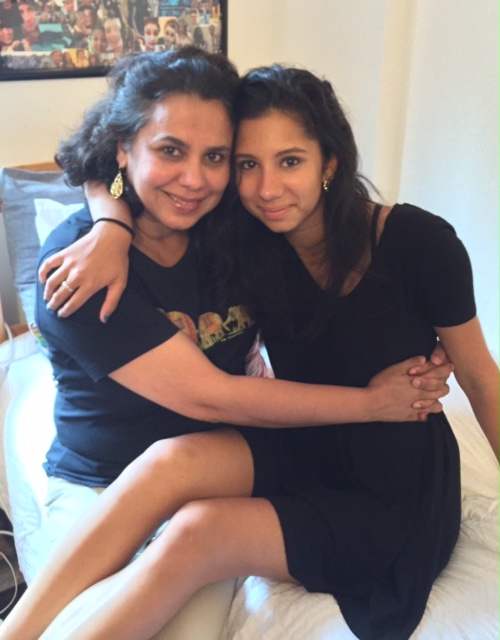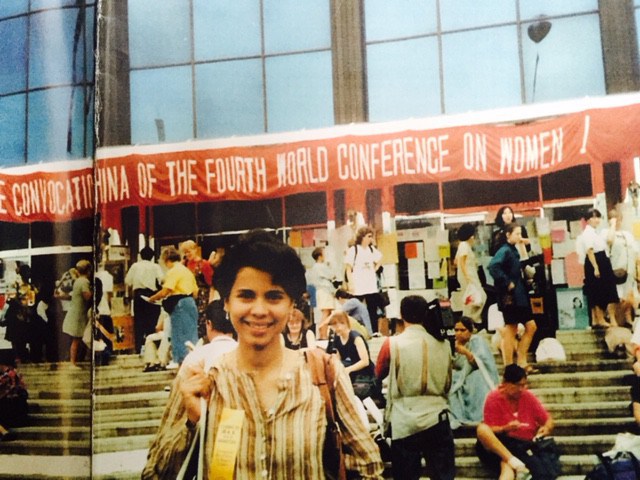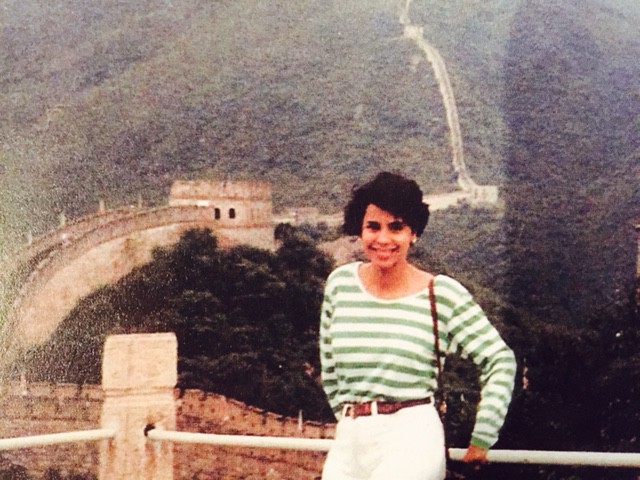Twenty years ago this month, I attended an event that changed my life. On the 20th anniversary of the Fourth World Conference on Women in Beijing, and on the anniversary of Hillary Clinton’s speech there, I wanted to share my reflections on an inspiring and unforgettable experience.
Twenty years later, the images haven’t faded: women in saris, business suits, colorful African dresses, and abayas wading through ankle-deep puddles, carrying arm loads of pamphlets and materials, searching for meeting sites on incorrectly marked maps. For eight of our ten days in Huairou it poured. Tents set up for our meetings hung limp and damp. There was no drainage. Hastily laid pavement blocks succumbed to the ever-softening mud. But the women were undeterred. Huddled under canopies and umbrellas, cardboard boxes and shared raingear, we discussed, mobilized, advocated, educated, and negotiated.
In late August 1995, over 30,000 of us gathered in Huairou, China at the non-governmental forum for the United Nation’s Fourth World Conference on Women.
We arrived from every corner of the world. Many had never before left their villages or towns. Some spent their life savings to make the trip. We journeyed to Huairou to focus world attention on issues that matter most in women’s lives: access to health care, education, jobs, credit and the right to enjoy basic legal and human rights.
I traveled to China in August 1995 as a representative of the Commission on Global Governance, an independent group of 28 leaders from around the world. I flew Finnish Air from Geneva via Helsinki to Beijing. It was a packed flight. Not a single man was on board (except perhaps the pilot). The energy was contagious – plans were being made, experiences shared. There was a sense of impatience, of urgency. As we landed, someone shouted from the back of the plane. “Let’s make history.” I had goose bumps. Little did I know that my journey had only just begun.
The Chinese organizers tucked us away in Huairou, 40 miles north of Beijing, fearing we would be too annoying in the capital, would run around naked in Tiananmen Square or hang our “unmentionables” on hotel balconies. Many of us stayed in Beijing, waking up at 6 am each morning to take the bus to Huairou. Dropped off at one end of town, we would trek what seemed like miles in the rain, lugging our boxes of flyers and programs through the maze of tents, buildings, and half-finished concrete apartment blocks, hurriedly converted into shopping centers. The organizers probably hoped we would give up and go shopping instead.
The women in Huairou were just like you and me – homemakers, teachers, lawyers, policymakers, and doctors; mothers, wives, sisters, daughters, workers, and leaders. They were strong, passionate, articulate, and committed. Each had a story to tell. I wanted to hear them all. I met a young Muslim woman from Turkey. She was probably 25 or 26, bright, eloquent, and positive. In one of the workshops on women in Islam she spoke so honestly about the hijab and why she wears its. I met another woman from Tibet. She was determined to be the voice for all her Tibetan sisters. She spoke to me about taking responsibility: “All of us in the free world, we take so much for granted every day,” she said, “our ability to choose how we live our lives, our rights, our freedom.” Her message was clear, and echoed what Hillary Clinton would later say: those of us who had the opportunity to be in Huairou have the responsibility to speak for those who could not make it.
Hillary Clinton, then First Lady, gave what many still regard as her most powerful remarks. Her words still echo loudly in my conscience: “I believe that, on the eve of a new millennium, it is time to break our silence. It is time for us to say here in Beijing, and for the world to hear, that it is no longer acceptable to discuss women’s rights as separate from human rights… If there is one message that echoes forth from this conference, it is that human rights are women’s rights. And women’s rights are human rights, once and for all.”
My emotions ran high. For so long, perhaps all my life, I had been able to hide – behind my gender, my family, my culture, my husband. There was nowhere to hide in Huairou. I felt exposed. I had to confront myself, alone. What did I stand for? What am I passionate about? What do I believe in? And what am I going to do about it.
These questions haunted me in Huairou. I wanted to talk to as many women as I could to learn from their experiences: how do they raise their families? How do they balance their work and family lives? What inspires them? What gives them courage? What makes them cry? I let their stories wash over me, hoping I could imbibe their sense of purpose and determination.
Perhaps for the first time I understood the incredible gifts women share: their capacity for compassion and self-sacrifice, their courage and perseverance, their patience and tenacity, and their tremendous ability to love and connect. And that however different we may be, we are joined by common circumstance.
I would later discover, that I was six weeks pregnant while I was in Beijing. Maybe that’s why I felt such a sense of urgency. My daughter is going to live in the world that I am helping to shape for her. She’s going to benefit or hurt from the choices I make, from my action and inaction.
Twenty years later, I still don’t know all my answers. But at least I know better what questions to ask. I ask myself every day. And now, my daughter asks her own set of questions.
Sometimes it takes only one person to open your eyes and make you think. In my case it took 30,000 … and one.
[separator type=”thin”]
This post was originally published on the blog 30days30deeds

Salma Hasan Ali is a Washington, DC based freelance writer, Contributing Editor of The Islamic Monthly, and Chief Inspiration Officer of MoverMoms, an NGO that promotes service. Her Ramadan blog is at www.30days30deeds.com.






2 Comments